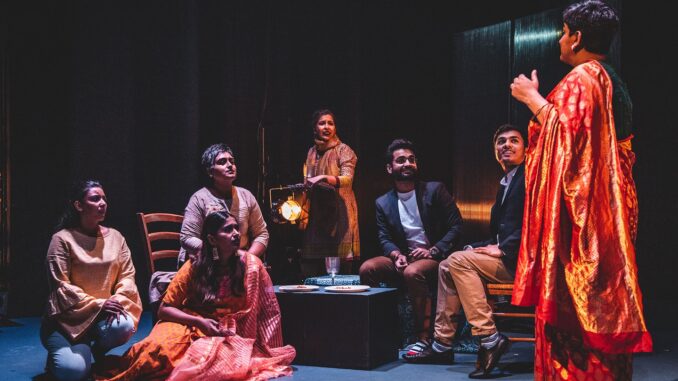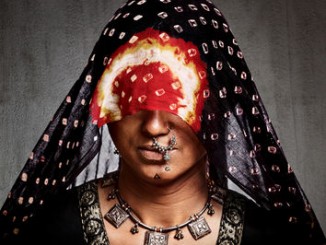
[Eight Journeys, Many Perspectives]
Yātrā is a curation of eight play extracts from leading South Asian playwrights, delicately woven together to revitalise community spirit in the face of an unprecedented humanitarian crisis. The Covid-19 pandemic lingers in the shadows of this show – until a fortnight ago, it was yet to be confirmed whether Yātrā would go onstage to mark Prayas’ fifteenth anniversary. The anthology presents manifold shades of resilience and perseverance, bringing characters navigating xenophobia, sexism, misogyny and the intergenerational traumas of colonisation into the spotlight.
The play extracts are set up in a timeless space onstage, with an evocative, welcoming atmosphere grounded in Ritesh Vaghela’s nuanced soundscape and Padma Akula’s vibrant costume design. The foyer is abuzz with anticipation and enthusiastic gratitude for the privilege of watching live theatre – one easily taken for granted before the start of this year. A sense of mystery pervades the smoky space of the stage, whetting the audience’s appetite for the magic of theatre.
The first play, Keats was a Tuber (by Polie Sengupta), delves into the anachronistic standards that decorate educational institutions, and the farcical degree to which the older generation cling onto these to maintain a sense of psychological safety. Adil Yazdani shines in the stentorian role of Mr Iyer, and Agustya Chandra handles the deft balance between accuracy and vulnerability in the role of Ramanan, who has a speech-impairment. Andrea Gerstenmaier and Gayatri Adi radiate charm in the detached, comically absurd characters of Dr Dennis and Ms Sarala. Amit Ohdedar’s steady direction is anchored in years of experience, but seems to veer off course with the entry of Ruzbeh Palsetia’s character Raghu, ending without denouement by the time we transition to the next chapter.
I Really Have to Meet God (Shashikant Tasgaonkar) is a playful journey that unearths class relations in a society addicted to elitism. Rishabh Kapoor’s direction is both concise and flexible, allowing actors Sudeepta Vyas and Shivneel Singh breathing room to play with the edges of their characters’ journey in a holiday home. They chatter about the importance of stealth for the subservient role of a domestic manservant, and the virtues that might reward them over time. Vyas in particular delivers a confident performance, basking in a carefree physicality seldom seen in anthologies adapted for the stage.
Aurat (Safdar Hashmi) is a sequence focused entirely on the female characters. Director Sneha Shetty explores the boundaries of emancipation in a patriarchal world through the prism of a game of charades. There is a palpable sense of chaos that constantly threatens to overwhelm the audience, bringing the marginalisation of women inside and outside the private space of the home into full view. There is no climax in this one – rather, the constant use of freeze frame and direct address to the audience feels as jarring and abrupt as the ongoing – and incongruent – experience of misogyny in the public and private spheres.
In Guards at the Taj (Rajiv Joseph), Aman Bajaj directs a comical duo who provide a stream-of-consciousness-style commentary on the state of society as seen from the perspectives of two sexually and emotionally dissatisfied cisgender men. Actors Raj Singh and Agustya Chandra push the envelope of the imagination when discussing the most vulnerable groups living in the margins of society. A witty script is complemented by Calvin Hudson’s clever lighting design, leaving the audience wanting more from these examples of early prototypes of hosts paired to present a chat show.
The interval provides a few moments to collect my thoughts – Yātrā is marinated in a vision seeking to discover frontiers beyond the pitfalls of performing stereotypes. Natasha Iyer’s minimalistic set is proving to be versatile for the distinct settings of each play. My actor companion is also struck by the demonstrable ease with which each story carries a set of universally human instincts through the more comic or more tragic aspects of each story.
Rishabh Kapoor directs Thaneer Thaneer (Komal Swaminathan) from a place of earnest assurance in the belief that inspiration translates to action in moments of crisis. Nona Shedde, Porvi Fomra, Narme Deva and Roji Varghese glow in their roles as villagers seeking to overcome the dangerous political games played by powerful men in their quest for power. Instead, they seek only access to water, a struggle that proves more vituperative than anyone in the village thought possible.
Shweta Tomar’s energised performance in Know the Truth (Majula Padmanabhan) is matched by a self-actualised flair for truth telling that characterises Porvi Fomra, Gemishka Chetty and Arti Kansara’s moving rendition of a single woman’s monologue through the removal of her agency during the emotional rollercoaster of Ten Ton Tongue (Gautam Raja). Aman Bajaj’s direction focuses on a didactic adaptation of the decaying state of democracy in South Asia, whereas Sananda Chatterjee’s storytelling is rooted in a powerfully profound evisceration of the idea that consent is well-known in a world ruled by men.
These two pieces contrast with the mellowing influence of Harlesden High Street (Abhishek Majumdar), a piece that reflects on the intergenerational journey of postcolonial reality for South Asians living in Ealing, East London. Ayesha Heble’s anchoring stage presence feels like a warm embrace, matched by the effusive performances by co-stars Bala Murali Shingade and Ansh Malhotra as they deliver a moving tribute to the struggles of growing up brown-skinned in a white European world. Geography is upended with the gentle tones of a university lecture, even though the driving force of Majumdar’s work is nostalgia – yearning for a place to call home.
Each extract strikes a distinct chord with me as I ponder the moods evoked by the voices of the characters. I don’t feel that any of the extracts moved me as much as the final two pieces. Yātrā proves to be a homage to the staccato moments of split-second decision-making in life, casting the net widely into a blend of imaginations both past and present. I leave the venue feeling like I’d like to return to experience the sorrows, pains and rumbling laughter experienced by the cast in presenting this provocative, poignant anthology – a tribute to the topsy-turvy reality which we’re all living.
*In the interest of disclosure: I have previously acted in two Prayas productions during 2019, A Fine Balance and First World Problems 2.0.
Yātrā plays TAPAC 1 to 10 October, 2020.
SEE ALSO: Theatreview.org.nz review by Nik Smythe




Leave a Reply